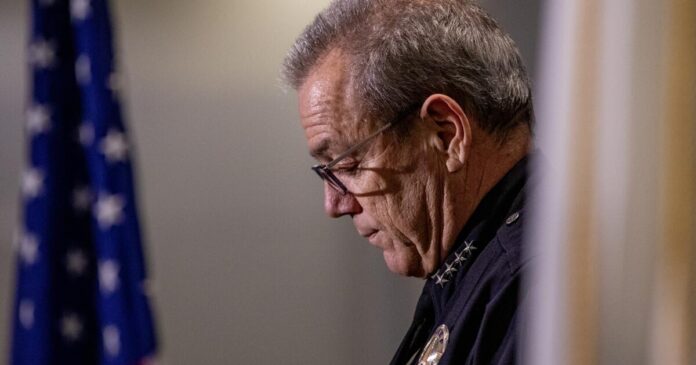
The California Department of Justice will not bring criminal charges against two LAPD officers involved in a fatal shooting that raised eyebrows when it was revealed that law enforcement’s initial version of the events was not completely accurate.
Officers shot Samuel Soto, 53, on the evening of July 26, 2021, after responding to an off-duty officer’s call that Soto was bleeding from the neck and carrying a blade on a Pico-Union street, according to a state Department of Justice report released Friday.
But the narrative of the shooting initially provided by Los Angeles Police Department Chief Michel Moore simplified a complicated situation. While Moore said a preliminary investigation showed that Soto was armed with a knife when shot and taken into custody, body-camera footage later released by the department showed that he dropped the knife after he was first shot by police and that other officers shot him again minutes later, while he was unarmed.
“After a thorough investigation, DOJ concluded that criminal charges were not appropriate in this case. However, DOJ recognizes the important lessons to be learned from this incident,” the department wrote in a statement.
California Atty. Gen. Rob Bonta’s office found that it could not be proved beyond a reasonable doubt that the officers did not reasonably fear for their safety and the safety of others when they shot Soto, making a criminal prosecution unwarranted, according to the statement. California law requires the DOJ to investigate instances in which “unarmed civilians” are killed by law enforcement.
The probe — which included interviews of officers and witnesses, as well as a review of body-camera footage — painted a picture of an already dangerous situation that was intensified by the arrival of backup officers and a low-flying police helicopter that hampered communication between the authorities.
One of the responding backup officers, David Voci, fired the three final shots that hit Soto, investigators said. In body-camera footage of Voci arriving at the scene, one of the first responding officers can be heard yelling that Soto was no longer armed with a knife. Soto was instead holding a black object — later identified as a phone — when he took two steps toward Voci, who shot him.
After shooting, Voci immediately asked colleagues if Soto still had the knife.
“No, the knife is over there,” one officer responded.
Soto was hospitalized immediately after the shooting and died from his wounds months later.
The day after the shooting, Moore told the Police Commission that officers responding to the intersection of Union Avenue and Pico Boulevard found Soto “holding a knife.”
“The officers gave Mr. Soto commands. However, he refused to comply, and an officer-involved shooting resulted,” Moore told the panel. “Mr. Soto was struck by gunfire and taken into custody.”
The explanation did not mention that Soto was no longer armed when he was shot three times by Voci.
Moore later said he was giving the information he had at the time.
The DOJ’s report absolved Voci of wrongdoing in the shooting.
“The evidence supports the inference that Officer Voci reasonably, though mistakenly, believed Mr. Soto was armed with a knife and Mr. Soto posed an imminent threat to his life,” the report said.
The DOJ also found that a low-flying helicopter “created loud noise,” making “communication difficult and the scene more chaotic.”
Moving forward, the DOJ recommended that the LAPD evaluate whether officers followed departmental policies surrounding Tasers — as “all but one officer lacked fully charged or functioning” devices — as well as consider working with the Los Angeles Fire Department on ways to improve dispatch communication.
The DOJ also said there was insufficient evidence to bring charges against Officer Eduardo Martinez, who shot Soto when he ran toward him with a knife, before backup arrived, investigators say.
The LAPD did not immediately respond to a request for comment.



